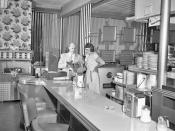We have all visited restaurants before, hungry with anticipation of consuming a good meal in return for our precious and cautiously spent money. Eating out is an expensive business and you really want to be sure you get a good experience. Sadly, this doesn't always happen. Who or what is to blame for this?
Successful restaurants offer a seamless dining experience. The appeal of the meal to some, is the best part, but there are so many things that go on behind the scenes to make your experience enjoyable and pleasurable. There is something intriguing that comes to mind when thinking about going out for a meal that's indescribable. There is the unbearable excitement anticipating the meal, however there is not just one thing that earns my experience top marks. Doesn't it seem that you only notice how good a restaurant is when you notice the same things going wrong in a bad one? This makes it easy to point out what makes a bad restaurant -well- bad.
To me, the fun part of going to a restaurant in the first place is the unhurried social experience-contradictory to my every day life-with plenty of time to interact with your guests. The setting should encourage a relaxed conversation and enjoyment of the food. For this to happen, the restaurant needs to be appropriately busy. Nothing is worse than a restaurant bursting at the seams with headache provoking noise levels, but a dissonantly silent room can be just as bad. At the same time, tables should be spaced just right so that you don't feel like people are eavesdropping in on you. What creates the buzz of a place is indefinable, but we all know that situation when the atmosphere is utterly and indescribably "right".
An important quality that sets good restaurants apart from others is their ability to serve a specific age group, because all customers don't want to be treated the same in every restaurant (can I have a smile with my happy meal, please?). Walking into the yacht club for example, your prerequisite opinions would be confirmed-yes, it's mostly retired sailors that eat there. However, there's no doubt that children and middle-aged working people come to eat there too! For this reason, the menu should appeal to different people and tastes. If it's a specific cuisine that they serve, whether it is Italian or Japanese, they should allow some flexibility so that every one enjoys themselves. You might like curried liver, but that doesn't mean everyone does.
Service is a key issue, which we tend to notice more when it's bad. Likewise, good service is easy to recognize: agreeable, friendly and attentive. I don't want the workforce hovering around me with radar all night, detecting my every twitch. However, waiting twenty minutes to get another fizzy water is inappropriate. A medium where you check up on your customers or pass by occasionally, seems appropriate. The servers aren't getting paid to ask if you want a refill every five minutes. Good servers mosey around the area of their table, and expect that the customer has the authority to speak up, especially on a busy night. They stop by occasionally, respectively to check up.
Knowing what is more important-polishing the back-up stock of spoons until they are uncannily spotless, or bringing a starving to death return-customer their meal, seems like an effortless decision, but you'd be surprised. Keeping up with demand and knowing your priorities makes the restaurant function. It's like when you were a teenager and you could either go to the beach or study for your final. The choice seems simple, but that doesn't mean that everyone selects that option. Obviously, one has much better results than the other, as well.
The restaurant business is one of high demand and expectations, picky customers, and let's not forget: profit. I want to eat at a restaurant where I can tell the staff and managers are passionate about the food, and whose primary goal is excellence, not making a fortune. Decent restaurants should be rewarded however, because where would servers' motivations come from without the generous tips us cherished customers leave? These guidelines briefly touch upon the complicated and dedicated industry of cuisine, but they can be easily summed up. The fact is, a company is only as good as the people it keeps. If they build a great experience, customers tell each other about that, and word of mouth is very powerful!


